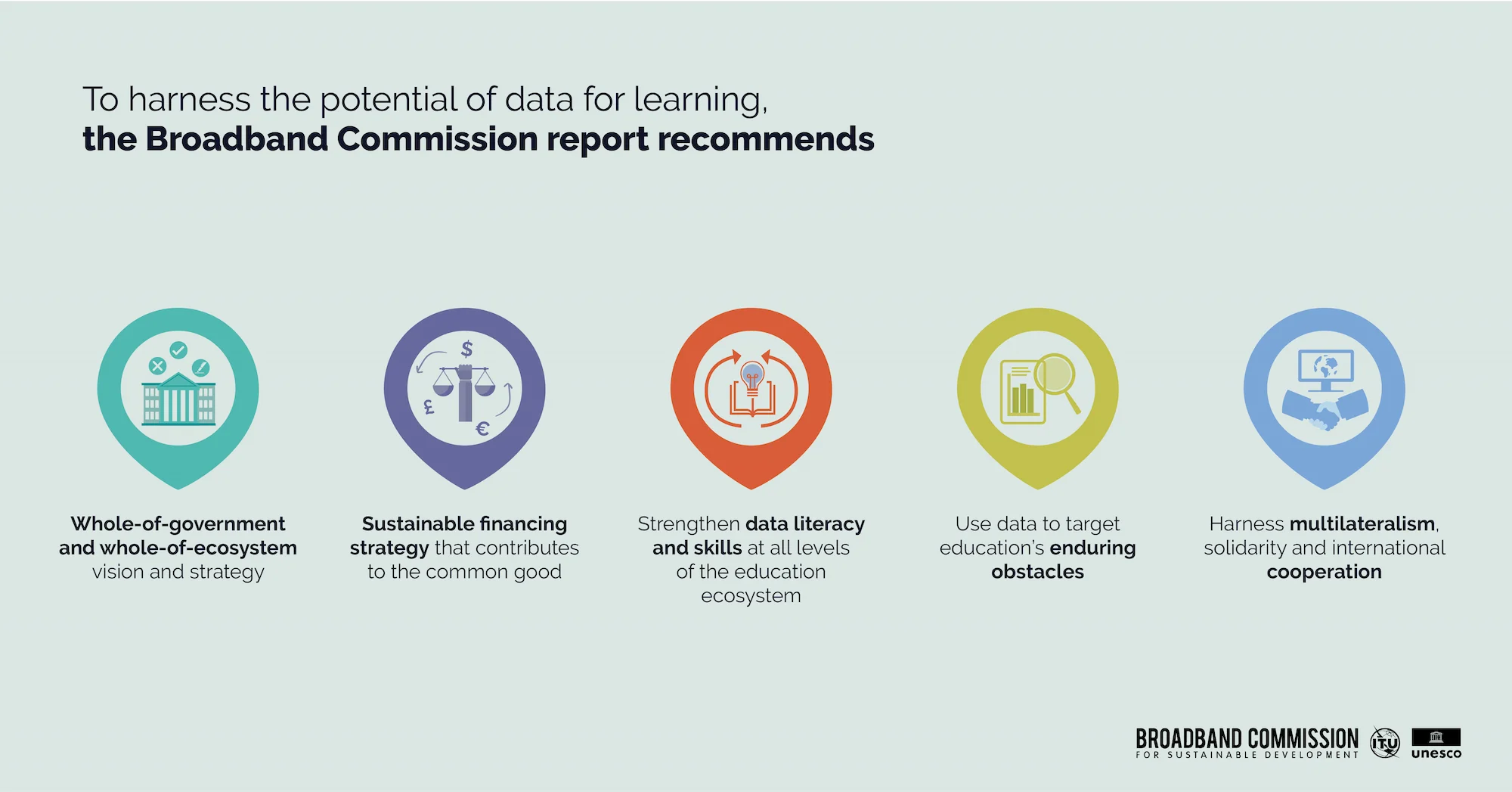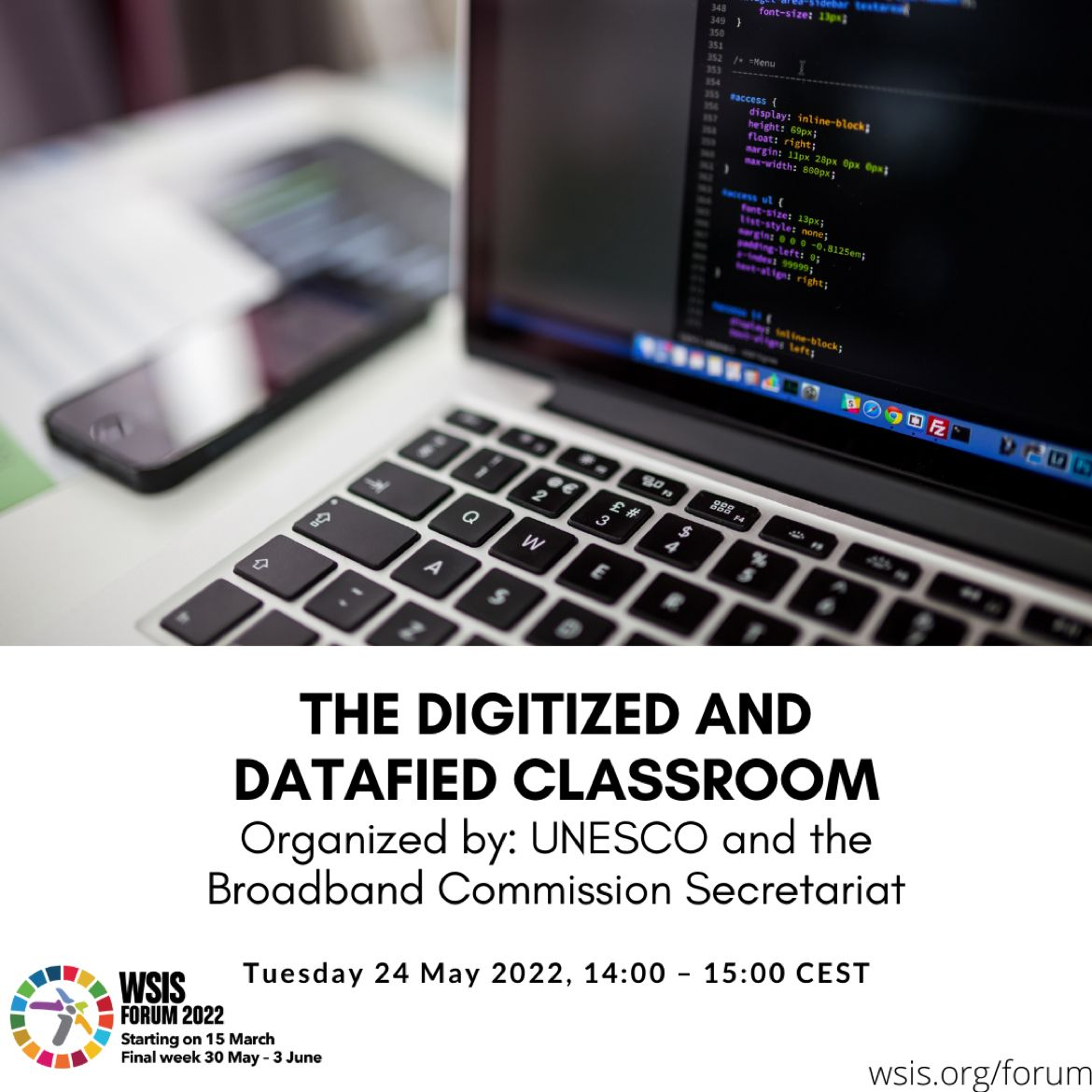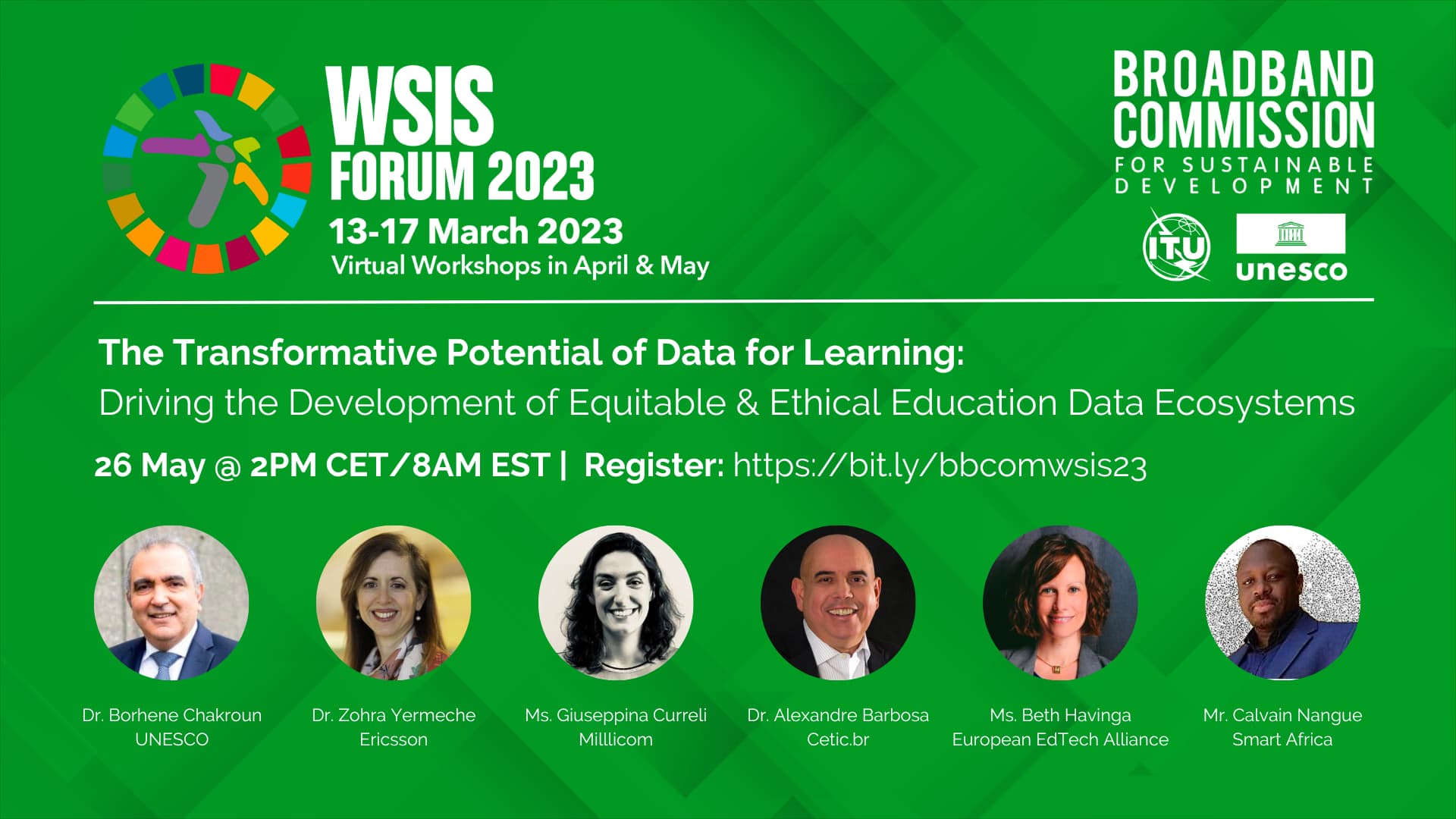How can we harness the potential of data to drive the safe, inclusive, and equitable transformation of education?
The Broadband Commission Working Group on Data for Learning was launched to discuss the broad theme of education data across three dimensions: infrastructure, capacities, and governance, meeting monthly for the past two years. Chaired by Ms. Audrey Azoulay, Director General of UNESCO, the Working Group promotes sustainable multistakeholder partnerships that advance impactful and ethical applications of education data that benefit all learners.
Drawing from nearly two years of discussions, the Working Group report “The Transformative Potential of Data for Learning” and its accompanying “Job Board for Data Governance and Management in the Education Sector” are global public goods that contribute to our common understanding of how to close the digital data divide and improve data practices in education.
The report takes the position that data for learning is a double-edged sword that hangs in a balance between benefits and risks. The potential power of leveraging data to improve learning is unevenly distributed around the world, resulting in global asymmetries related to data access, skills, and sovereignty. The Working Group report includes five recommendations to make the education data landscape less polarized and more equitable, ethical, and effective for learners everywhere.
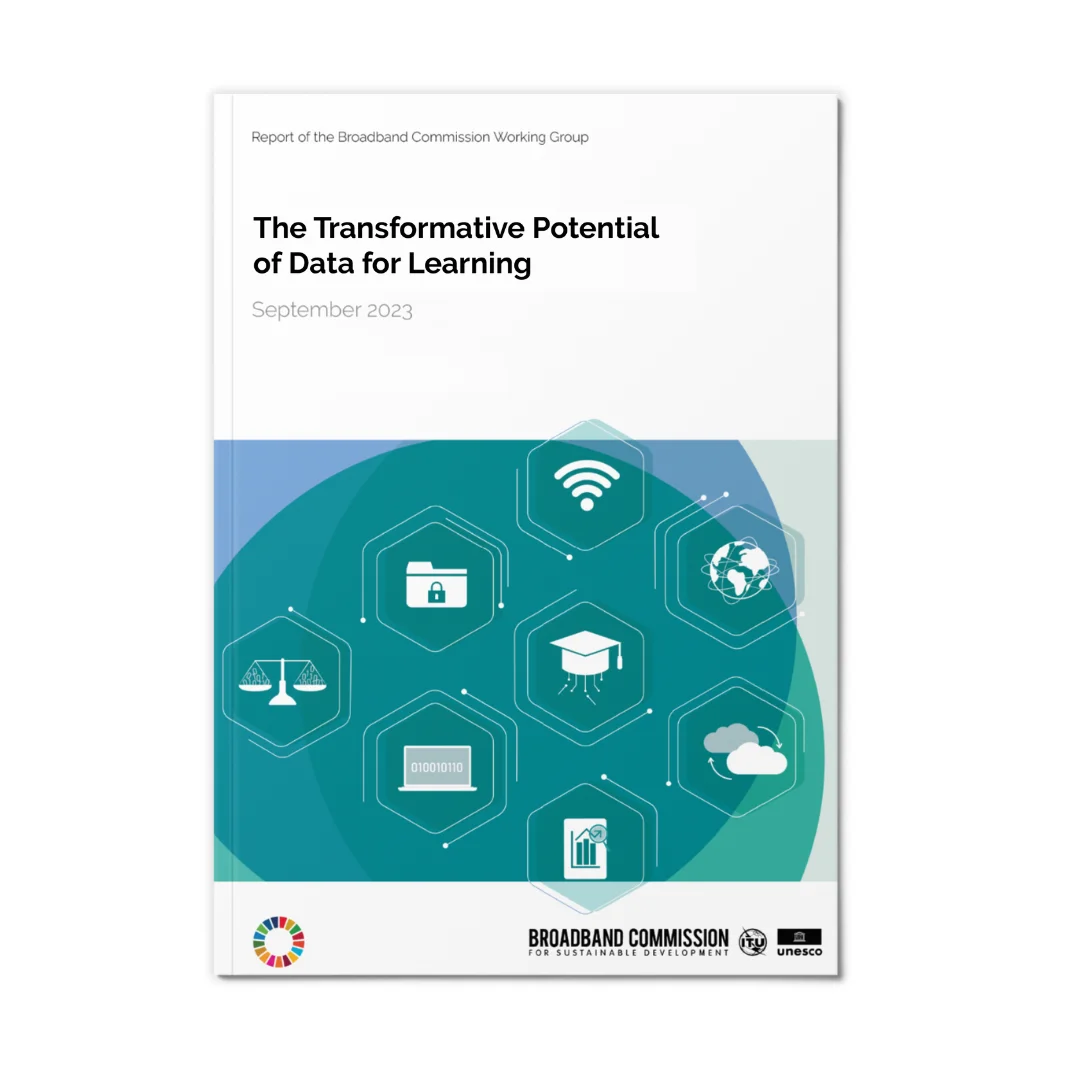
Working Group Outcome Report
The Transformative Potential of Data for Learning
Setting the Stage
Background Overview
Data in education is a double-edged sword, offering both transformative potential to improve education systems, as well as risks that need to be taken seriously.
This report helps us understand what the global community needs to do to build, reinforce, and maintain the data architectures that support safe and effective use of digital tools in education to improve lifelong learning for all.
To do this, we must work together to overcome three global asymmetries are limiting the potential of data for learning.
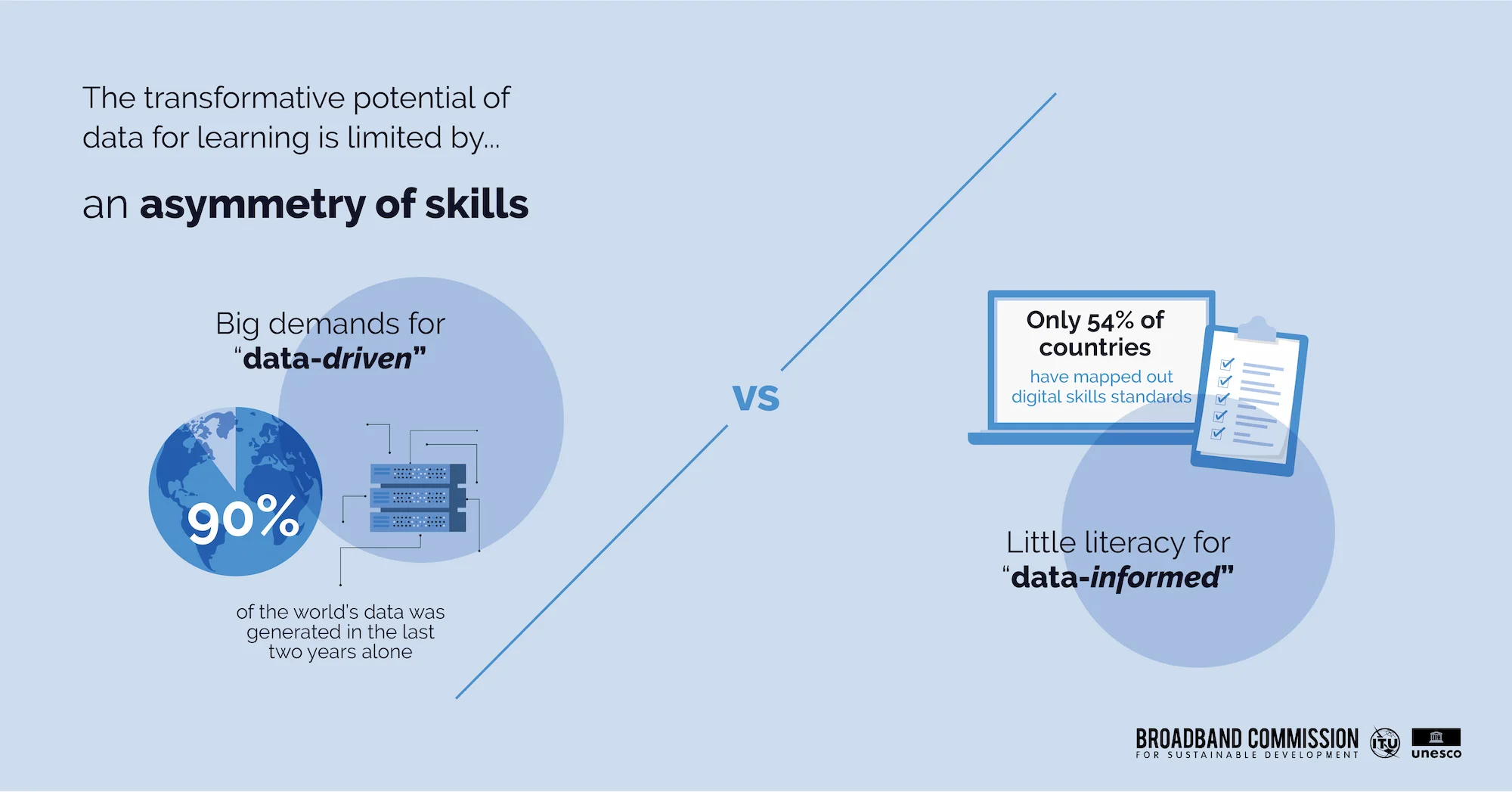
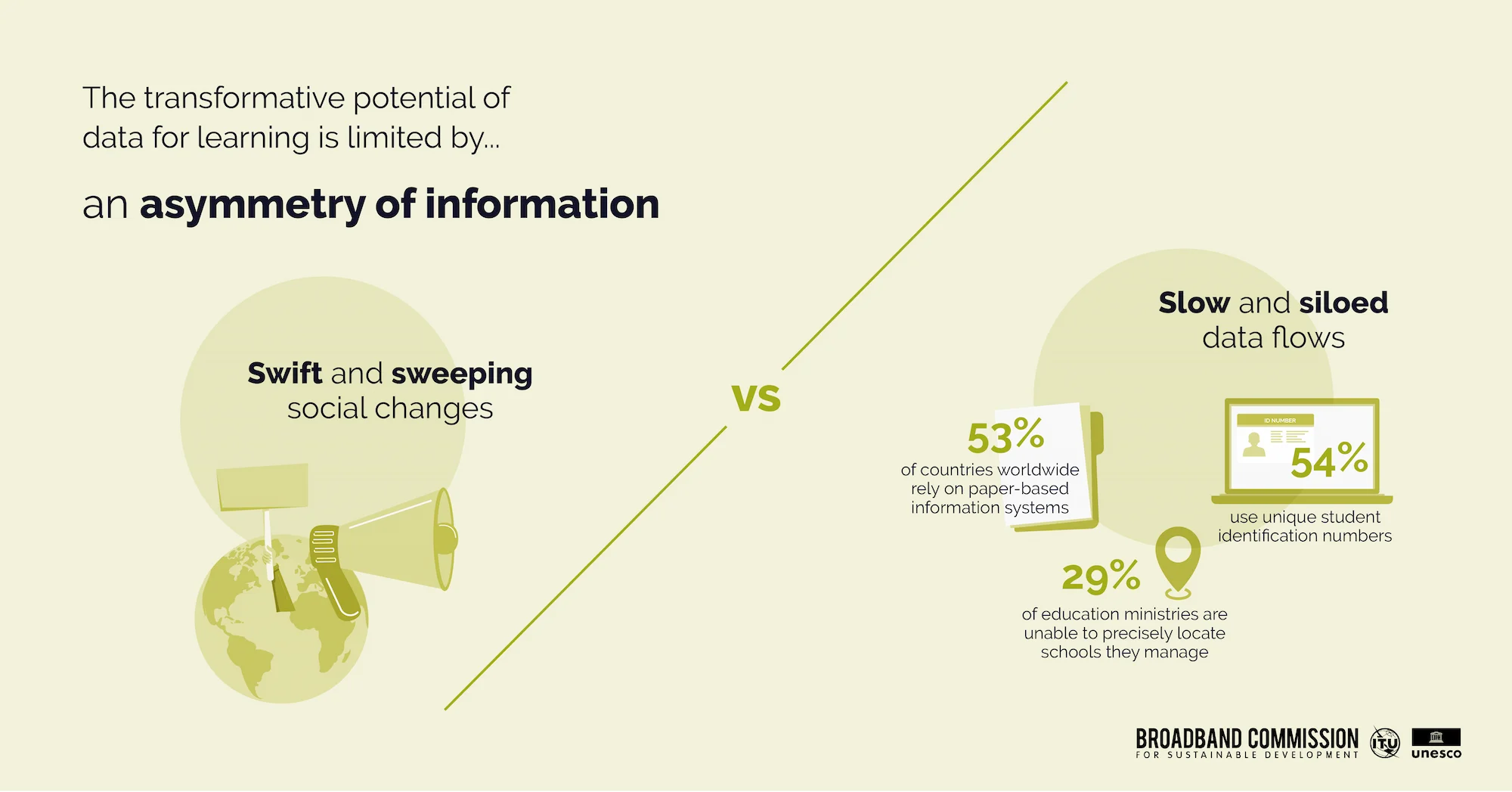
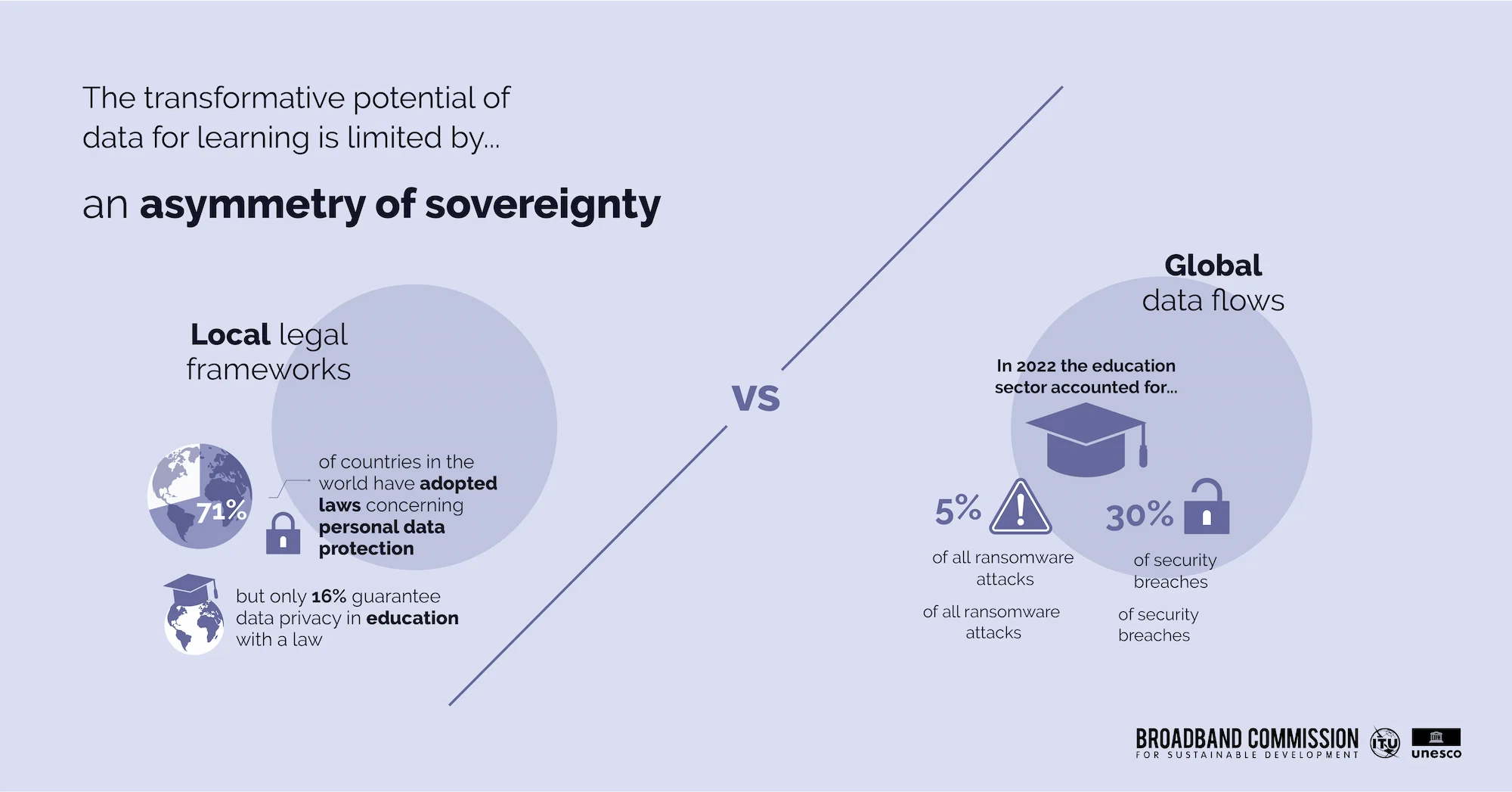
Facing these asymmetries, issues of data ethics, security, capacities, innovation, regulation, sustainability and openness are relevant across all contexts. The Working Group brings these topics into one space in the final Working Group Report to analyze current trends, share case studies, and offer recommendations for a pathway forward for multilateral, multistakeholder cooperation.
The Way Forward
Key Findings
1
We need to close the digital data divide to make education more relevant and resilient for all learners everywhere.
Globally, we generated over 100 trillion gigabytes of data last year, but many low and middle-income countries still do not have basic data on learning.
The report calls for government and industry cooperation to ensure ethical and affordable data use to target education’s systemic challenges.
2
We need to close the data skills divide to make education data use safer, smarter, and more secure.
In an age where algorithms influence our daily experiences, only 54 per cent of countries have mapped out digital skills standards, and fewer have strategies to strengthen data literacy. Only 11 out of 51 governments have implemented curricula that develop AI and data competencies.
The report calls for government and industry cooperation to improve data skills at all levels of the education ecosystem for informed decision-making and stronger links between education and the future of work.
3
We need to strengthen international normative instruments for data-sharing across borders and between public and private institutions.
Despite the global nature of data flows, minimal international cooperation around data governance, regulation, intellectual property legislation, licensing and cybersecurity prevent data for learning from being a common, public good.
The report calls for government and industry cooperation to ensure that access to information on learning and education more broadly is not only reserved for those who can pay for it, and that the knowledge commons remains a shared, community-owned resource.
Focus Area
Outcome Resources
Chair
Audrey Azoulay
Director General, UNESCO and
Co-Vice Chair of the Broadband Commission
Broadband Advocacy Targets
SDGs
The Working Group Model
Composition and Activities
Ms. Audrey Azoulay
Director General, UNESCO, Co-Vice Chair of the Broadband Commission
The Working Group was coordinated by a UNESCO team led by Mr Borhene Chakroun, Director of the Division of Policies and Lifelong Learning Systems, with support from Juliette Norrmén-Smith, Associate Project Officer, and Saurabh Roy, Senior Project Officer.”
- Dr Tedros Ghebreyesus, World Health Organization (represented by Mr Derrick Muneene)
- Baroness Beeban Kidron, 5Rights Foundation (represented by Ms Sonia Livingstone)
- Mr Lacina Koné, Smart Africa (represented by Ms Aretha Mare, Ms Thelma Efua Quaye, Mr Calvain Nangue and Mr Osman Issah)
- Professor Jeffrey Sachs, The Earth Institute, Columbia University (represented by Dr Radhika Iyengar)
- Professor Mercedes Aráoz, Peru
- Dr Lee Yee Cheong, Former Broadband Commissioner, International Science Technology and Innovation Centre for South-South Cooperation, UNESCO
- Mr Amir Dossal, Global Partnerships Forum
- Mr Bocar Ba, SAMENA Telecommunications Council
- Mr Erik Ekudden, Ericsson (represented by Ms Zohra Yermeche)
- Mr Achim Steiner, United Nations Development Programme (represented by Mr Gayan Peiris)
- Dr Rumman Chowdhury, Parity Responsible Innovation Fund
- Dr Qu Dongyu, Food and Agriculture Organization of the United Nations (represented by Mr Maximo Torero, Mr José Rosero Moncayo and Mr Henry Burgsteden)
- Mr Mauricio Ramos, Millicom
- Mr Piotr Dmochowski-Lipski, EUTELSAT IGO
- Ms Sima Sami Bahous, UN Women
- Ms Maria Florencia Ripani, Fundación Ceibal
- Mr Dale Allen, DXtera Institute/EdSAFE AI Alliance
- Mr Alexandre Barbosa, Cetic.br, UNESCO Regional Centre for Studies on the Development of the Information Society
- Mr Fabio Senne, Cetic.br, UNESCO Regional Centre for Studies on the Development of the Information Society
- Mr Werner Westermann Juárez, Library of National Congress of Chile
- Ms Carmela Salzano, Global Partnership for Education
- Mr Amit Prakash, Centre for IT and Public Policy, International Institute of Information Technology Bangalore
- Mr Wayne Holmes, Institute of Education, University College London
- Mr Doug Casey, Connecticut Commission for Educational Technology
- Ms Karine Sonigo, International Labour Organization
- Ms Beth Havinga, European EdTech Alliance
- Mr Ashok Goel, National AI Institute for Adult Learning and Online Education
- Dr Joanna Rubinstein, former Broadband Commissioner and Council Member of the UNSDSN
- Mr Shiloh Naiken, National Education Collaboration Trust, South Africa
- Ms Tracey Burns, National Center on Education and the Economy
- Ms Pascale Raulin-Serrier, Commission Nationale de l’Informatique et des Libertés
- Mr Xavier Delporte, Commission Nationale de l’Informatique et des Libertés
- Mr Jun Yu, National University of Singapore
- Ms Velislava Hillman, London School of Economics
- Mr Stéphan Vincent-Lancrin, OECD
- Ms Carol O’Donnell, Smithsonian Science Education Center
- Ms Kati Tiainen, Microsoft
- Ms Ellen J. Helsper, Department of Media and Communications, London School of Economics
- Ms Lidija Kralj, European Union
- Mr Shitanshu Mishra, UNESCO Mahatma Gandhi Institute of Education for Peace and Sustainable Development
Events
WSIS 2022 Session: The Digitized and Datafied Classroom
This online session highlighted the work of the Digital Learning and Data for Learning working groups of the Broadband Commission. Borhene Chakroun, Director of UNESCO’s Division for Policies and Lifelong Learning systems, moderated a panel discussion about the barriers and opportunities to leverage digital, data-informed technologies to support the needs of all learners, especially the most marginalized. The discussion will highlight promising practices of digital tech and data use in teaching & learning that could continue be continued beyond the pandemic. Panel speakers included:
- Dr. Sonia Livingstone, representing Commissioner Baroness Beeban Kidron, 5 Rights Foundation
- Ms. Zohra Yermeche, Representing Commissioner Mr. Erik Ekudden, Ericsson
- Dr. Joanna Rubenstein, Former Commissioner, Former President and CEO, Childhood USA
- Mr. Alex Wong, ITU, Senior Strategy Advisor and Lead, Giga, Representing ITU
- Mr. Bryce David Hartley, Representing Commissioner Mr. Mats Granryd, GSMA
WSIS 2023 Session: The Transformative Potential of Data for Learning
The session brought together high-level multistakeholder speakers from the Broadband Commission to discuss how to harness the equitable and ethical use of data to improve learning, teaching, administration and management. The conversation focused on how to find the balance between protecting learner privacy and promoting data innovation in pedagogy and practice, under the guiding principles of: international cooperation for equitable financing, inclusive data ownership, and the development of data literacy worldwide to support democratic societies where fact is discernible from fiction. Panel speakers included:
- Ms. Giuseppina Curreli, Director of Political Relations and Education Programs, Millicom
- Ms. Zohra Yermeche, Program Director, Sustainability and Corporate Responsibility, Ericsson
- Dr. Alexandre Barbosa, Head of the Regional Center for Studies on the Development of the Information Society, Brazil
- Ms. Beth Havinga, Founder and Managing Director, European EdTech Alliance
- Mr. Calvain Nangue, Strategic Advisor – ICT Skills and SADA Sustainability
- Digital Infrastructure, Skills and Empowerment Directorate
In monthly meetings since January 2022, the group has shared experiences and case studies on subjects related to education data ecosystems, such as the development of data-fuelled learning systems, interoperability frameworks, and ethics and inclusion in AI-driven technologies used in education and training.



